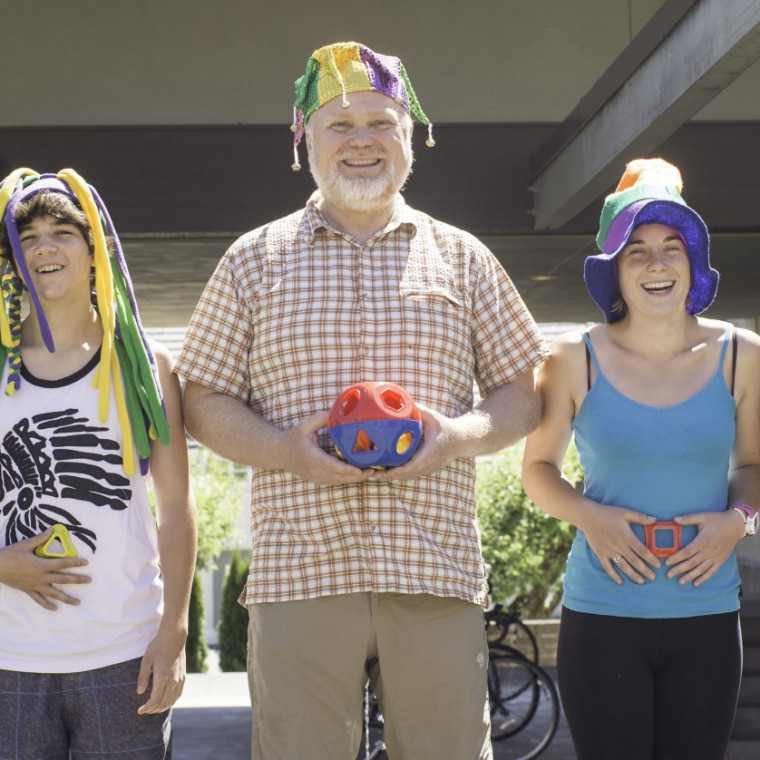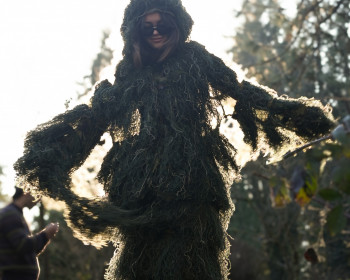Summer student research: Motivating healthy behaviors
Noah Callaghan ’15, Susan Heinselman ’15, and Joel Schooler ’15 are working with high school student Elijah Rebensdorf and Associate Professor of Psychology Erik Nilsen to study how our interactions with technology impact our motivation to be healthy. They reflect on this experience in the following Q&A.
Open gallery

Lewis & Clark students remain closely engaged with their fields of study during the summer months, and many make meaningful contributions to scholarship by collaborating with faculty on innovative research. Noah Callaghan ’15, Susan Heinselman ’15, and Joel Schooler ’15 are working with high school student Elijah Rebensdorf and Associate Professor of Psychology Erik Nilsen to study how our interactions with technology impact our motivation to be healthy. They reflect on this experience in the following Q&A.
What are you researching?
We are researching both how toddlers interact with technology and how adults are motivated to exercise. Our primary hope is to determine how increased use of technology among preschool-aged children is affecting their shape recognition and creativity. This has led us to an interest in how the process of digital self-tracking can affect one’s desire to exercise.
What initially sparked your interest in this project, and how does it relate to your previous coursework?
What sparked our interest in this project was a collective curiosity about the implications of using of technology, both when interacting with children and with oneself. Our work expands upon a previous summer research project, which less specifically investigated the relationship between childhood play and the quantified self. The quantified self is established by collecting data on oneself, formally or informally, in order to change behavior.
How has your Lewis & Clark education been enhanced by close collaboration with faculty?
Close collaboration with faculty has greatly enhanced our Lewis & Clark education because it has provided us with the opportunity to get hands-on experience in the field of psychology. Without this collaboration, it is more difficult to understand the practical applications of theoretical concepts that are taught in the classroom.
Does your research have potential to be applied in the real world or to influence other work in your field?
Our research is very applicable to the real world. It is based on a widespread concern: many people are seeking the motivation to exercise. It also relates to various other psychological studies that aim to understand the results of human interaction with technology. We believe that our research has the potential to spawn further related studies.
How will this research experience hopefully impact your future studies or professional pursuits?
We all have different goals for our futures, but this research experience will hopefully open the doors to graduate school even further than would a bachelor’s degree alone.
About the Rogers Science Research Program
The John S. Rogers Science Research Program allows students to pursue graduate-level research in the natural and mathematical sciences. It emphasizes strong communication skills, requiring students to publicly present their findings. This summer, more than 50 students are being sponsored to study such topics as memory formation, cybersecurity, and the impact of nicotine on flies.
“We’re not asking you, ‘What’s the answer?’ We’re saying, ‘What’s the question?’” said Michael Broide, director of the Rogers program and chair of the physics department. “I think what sets our program apart is that regardless of what project you are on, we’re all going to come together as a group to present what we’re doing in as accessible a way as possible. In science, it’s such an important skill to be able to explain cogently what you’re doing.”
Students make their final research presentations at the Rogers summer science poster session, held in conjunction with the Science Without Limits Symposium. Scheduled for September 17, the poster session is free and open to the public.
Katrina Staaf ’16 contributed to this story.
More Newsroom Stories
Public Relations is located in McAfee on the Undergraduate Campus.
MSC: 19
email public@lclark.edu
voice 503-768-7970
Public Relations
Lewis & Clark
615 S. Palatine Hill Road MSC 19
Portland OR 97219

